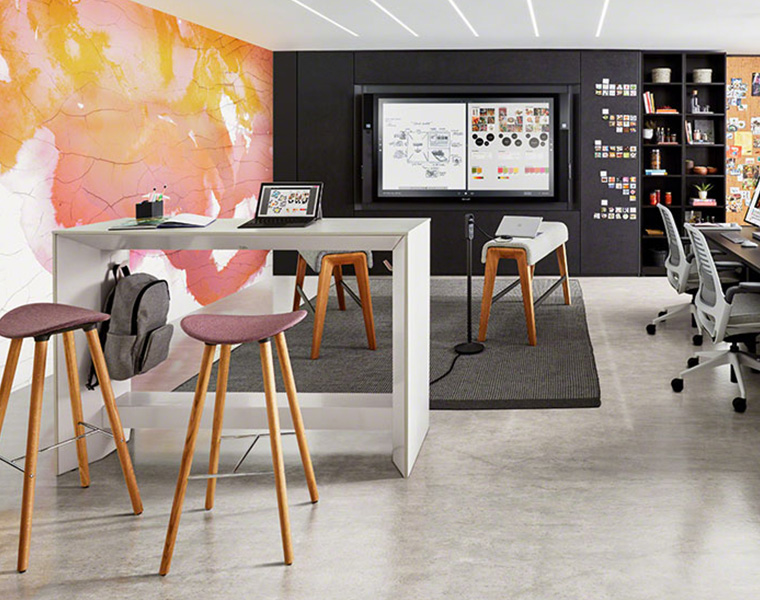“Ideas are the currency of the new economy”
Creativity and innovation are fast becoming a key part of corporate strategies and initiatives and for this reason organisations are asking their employees to come back to the office to connect with co-workers for improved collaboration, idea generation and problem solving. However, research has shown that even though creativity is high on the agenda, workplaces may not be designed to provide spaces to support the creative process.
Steelcase Creativity and the Future of Work Survey, 2017
Gallup, State of the American Workplace, 2017
Why do we need dedicated creative spaces?
When do you feel your most creative? Can you really be expected to collaborate efficiently and generate new ideas if you’re in an environment that is noisy, where you are interrupted or you don’t have the right tools to make your ideas visible, get inspired or share your ideas freely.
Being creative in environments that don’t support the process is an impossible task. On the other hand, picture yourself in a dedicated creative space – it may have natural views, use natural materials and employ biophilic design, offer a choice of standing or sitting positions for a fluid creative process, or be a private space with comfortable and relaxed seating; for processing information and reflection without interruption.
How can we unlock our creative potential?
Through our office design and planning process we are able to create workspaces with creativity and problem solving in mind. Taking into consideration the different types and stages of creativity that are most relevant to our customers and the way they work;
- Individual / Focus spaces – somewhere distraction free for individuals to reflect, think, incubate and later plan to implement ideas. The move between individual and collaborative work is part of the creative process and both require very different kinds of spaces.
- Social spaces – open, social spaces can encourage interactions that generate new ideas and allow people to connect and collaborate, potentially with colleagues from different functions and levels of a business in a relaxed, neutral environment. Building trust and social bonds are key in building confidence to share ideas freely.
- Duo – a space for co-creation with one or two colleagues – where everyone has an equal share of voice and projects can be moved forward at a faster pace. Clickshare technology helps to share pre-prepared content that is on the screens of all team members, helping to achieve a faster and more efficient collaboration process.
- Project team space – We don’t just work creatively within our own teams and departments. A dedicated creative space allows for cross functional / project team collaboration without interruption and will house all the necessary tools and technology to support the creative process. An ideal project team space will support the sharing of ideas by making thinking visible during the creative process. An interactive whiteboard or touchscreen can allow explore solutions to problems in real time and record them for sharing after the meeting. Video conferencing can also be integrated to allow remote colleagues to attend and contribute to the process as if they were there.
A culture shift
Creative work is a process in which people can engage when given the right spaces and tools. However, to truly tap into creativity and make it a way of life, it needs to become part of the culture of an organisation. Leading businesses are now taking cues from the “startup culture” by giving employees the space and freedom to explore new ideas. People need to feel emotionally comfortable and at ease to share ideas and make mistakes. High levels of trust and a strong sense of wellbeing and purpose are also important in making a cultural shift towards sharing ideas.
